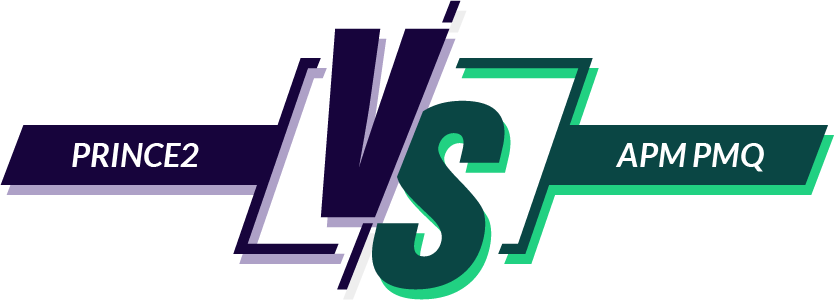News & Blog
Which is Better, the PRINCE2 or APM Project Management Qualification (PMQ)?
What’s the difference between PRINCE2 and AMP PMQ?
Not all project management job listings ask the candidate to have a project management qualification. But when they do, PRINCE2® and APM Project Management Qualification (formally known as PMQ) are the qualifications usually requested. I am often asked which of the two is the better qualification but it’s not a straightforward answer, as you will see.
PRINCE2 – A flexible framework and global market leader
PRINCE stands for PRojects IN Controlled Environments and was launched 1989. The ‘2’ was added in 1996 when the guidance was streamlined so that it could be used to manage smaller projects. Since then, there have been updates to the guidance but the ‘2’ has remained. The current version is called PRINCE2 7th Edition, released in 2023.
I’ve worked with trainers that were around when PRINCE first came out. One of them told me that they thought PRINCE was going to be a flash in the pan, a fad that would be over quickly. How wrong they were! With more than a million project managers holding a PRINCE2 qualification since 1995, across over 150 countries, this has got to be the global market leader.
There are two levels of qualification: the PRINCE2 Foundation level, which is taught over 2 or 3 days and has a 1-hour multiple choice exam; and the PRINCE2 Practitioner level, taught over 1 or 2 days with a 2.5 hour multiple choice exam.
Why is PRINCE2 so appealing?
There is something that happens when you get a group of PRINCE2 qualified people in a room together. Conversations go quicker. The common language that PRINCE2 provides really speeds things up. You don’t need to stop and explain things as much to other project team members. Of course, this could make it harder for non-trained members of the team to understand what’s going on and why. So they then go for training and the cycle continues. And that’s not a bad thing. A lot of people I’ve trained were there because they wanted more confidence in using project management terminology. The courses we run certainly gives you that.
There are also clues in the title of PRINCE2. It focuses on ways to give appropriate levels of control to the project team. Several principles underpin the framework, including ‘manage by stages’ and ‘manage by exception’. These work together to ensure that the project manager is authorised to run the project one stage at a time, and if there are any problems that they cannot resolve within their authority then the issue gets escalated to the project board. This very clear escalation process is very reassuring.
Also, the framework is designed to be tailored. It can be used very successfully with agile ways of working, as the PRINCE2 Agile guidance, published in 2015, demonstrates. It can also be tailored to fit with other project lifecycles such as the RIBA Plan of Work 2020, heavily used in the construction industry.

So, if PRINCE2 is so good, why are employers looking for candidates with the APM PMQ qualification?
Well, PRINCE2 focuses on what a project manager should be doing but doesn’t often specify how it should be done. For example, PRINCE2 recommends that each stage of the project should have a detailed stage plan with a schedule of activities. However, it doesn’t explain how to create the schedule. This is because a small, agile project would use different scheduling techniques to a large, complex infrastructure project and the choice of tools is left to the project team. But a project manager would benefit from understanding what tools are available to them. This is where the APM comes in.
The APM have a Body of Knowledge
The APM, the Association of Project Management, have been publishing their Body of Knowledge (BoK) since 1992, with BoK7 published in 2019. They were awarded chartered status in 2017, allowing project managers to become a Chartered Project Professional and put the letters ‘ChPP’ after their name.
They offer an entry level qualification, the APM Project Fundamentals Qualification (formally known as PFQ) which is usually a two-day course with a 1-hour multiple choice exam. The more respected qualification is the Project Management Qualification (PMQ), a challenging course that takes at least 5 days and has a 3-hour written exam at the end. If you really want to go for it, there is also the PM Project Professional Qualification (PPQ) but I’ll leave that for now.
What’s in the BoK?
The APM’s BoK contains a summary of current best practice in the project management industry. From leading virtual teams and conflict resolution to critical path analysis and contract management, it’s all in there. Well, a brief summary at least, followed by a list of references for further reading. It’s a great starting point but not many project managers will have the time, inclination or budget to pursue all that further reading.
The Project Fundamentals Qualification exam is tough but very well respected.
The Project Management Qualification exam assesses much of the material covered in the BoK. It’s a challenging course to teach, and a marathon event for learners because of the many and varied topics covered by the syllabus. It doesn’t help that pass rates have taken a knock since they changed the exam structure with the APM BoK7 exams. Still, if you can pass the Project Management Qualification then you deserve the respect it gives.
If you are about to sit your APM PMQ exam, then we have a really handy article here with tips to help you pass your PMQ exam.
But which qualification is better, PRINCE2 or PMQ?
Tricky. PRINCE2 and the Project Management Qualification complement each other. PRINCE2 gives us structure, controls and recommendations on how the framework can be tailored to suit any project. The PMQ assesses us on the tools and techniques that can be used within that environment. In the ideal world, with time and budget not a concern, I’d suggest that all project managers sit both courses and go for both exams.
And if time and money are an issue?
If I’m forced to make a recommendation about which qualification to go for right now, then I’d pick PRINCE2 (or even better, PRINCE2 Agile). Learn more about the difference between PRINCE2 and PRINCE2 Agile.
But if you have great typing skills and are an experienced project manager then don’t be scared off – You have plenty to say, I’m sure, and the PMQ is likely a good match for you.
However, if you are not a great typist and you have time, then it might be wise to give the APM a few years to get their BoK8 published before you go for the PMQ. The trainer community is hoping they will be more careful in their wording of the assessment criteria and relax some of the constraints currently imposed on the structure of the exam papers (here is an example of a PMQ exam paper from BoK7).
Otherwise, look to see what qualification is requested more in the job adverts that you are interested in. Just sitting on the course could be enough to get you where you want to go.

Author: Sue Hopgood
Senior Project Management Lecturer at MKC Training
Discover our other posts by category:
- Apprenticeships (3 posts)
- Armed Forces (7 posts)
- Company News (21 posts)
- Construction (8 posts)
- Courses (12 posts)
- Covid-19 (4 posts)
- Cyber and IT (4 posts)
- eLearning (6 posts)
- Engineering (2 posts)
- Events (4 posts)
- Exams (3 posts)
- Gamification (4 posts)
- Gas (1 post)
- Health and Safety (6 posts)
- ITIL (10 posts)
- Project
Management (22 posts) - Scaffolding (2 posts)
- Technology (13 posts)
- Training Strategy (8 posts)
